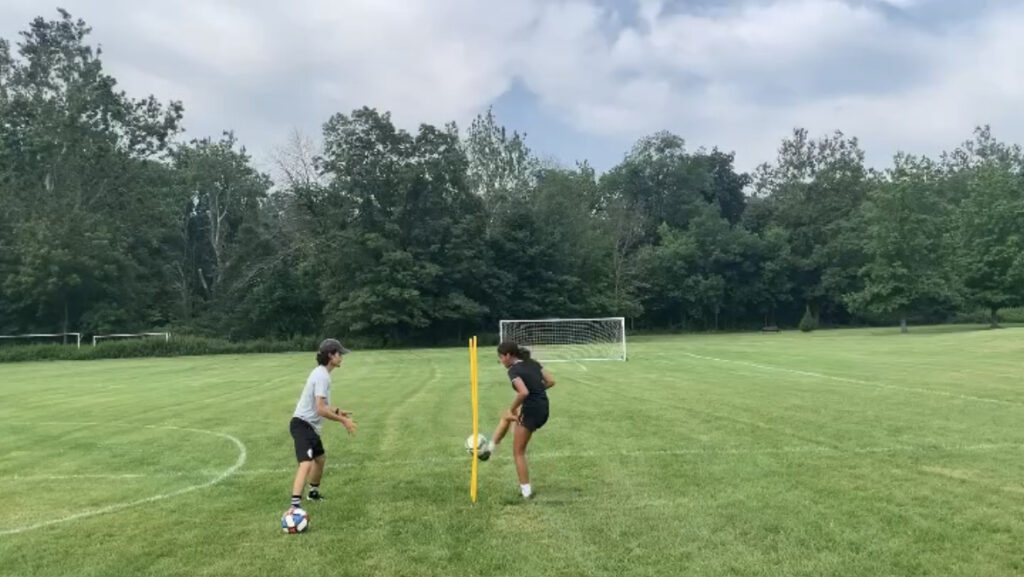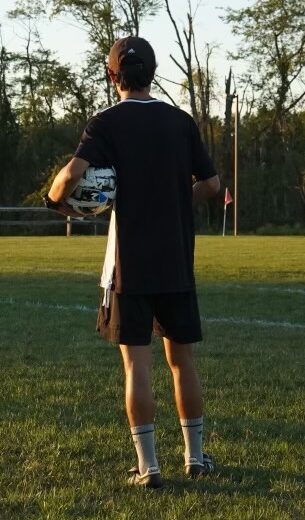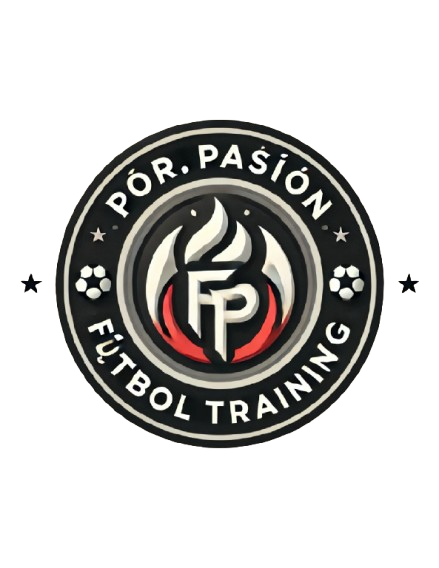Is Private Soccer Coaching Worth It?
By Michael Portillo
Player Development Specialist
In soccer, nothing happens by chance. The chaos of the game, the movement of the players, and the moments of brilliance are all connected by a singular truth: the game rewards those who are prepared to adapt, perceive, and act decisively. Private soccer coaching isn’t just about improving technique—it’s about shaping players who can think, move, and perform within the unpredictable rhythm of the game.
The Value of Private Soccer Coaching
Personalized, Game-Representative Training
Private soccer coaching focuses on one-on-one soccer training and group training tailored to individual or group needs. Soccer is not about isolated drills. It’s about the relationships on the pitch—the triangles, the spaces, and the decisions. A private coaching session must reflect this reality. Training should mirror the game itself, with players experiencing the unpredictability of real match scenarios. A highly skilled trainer should be able to offer the following:
- Game-Representative Design: Training that mirrors the chaos and unpredictability of real games, allowing players to adapt and self-organize.
- Targeted Development: Whether it’s enhancing first touch, shooting accuracy, or tactical awareness, private sessions provide bespoke attention to areas needing improvement.
- Enhanced Soccer IQ Training: Players learn to perceive and act upon invitations for action (affordances) in dynamic game scenarios. Most effective in group sessions to pick up decision making skills.
While traditional training often emphasizes repetitive drills, it’s crucial to recognize that skills practiced in isolation may not seamlessly transfer to the dynamic context of a real game. This phenomenon is developing skills that don’t require adaptation or real-time decision-making. To cultivate truly adaptable players, training should immerse them in unpredictable, game-like scenarios where they must continuously perceive, decide, and act based on the ever-changing environment.
One of the challenges I often see is players training by themselves or even with trainers who focus solely on repetitive drills. While this can be helpful to improve how you feel, it often lacks the variability and unpredictability of real games to improve how you play. Soccer is a fluid sport where openings and opportunities constantly emerge and disappear. To thrive, players must develop the ability to recognize and act upon these “invitations for action.”
Invitations for action are the opportunities a player perceives in a game—a gap between defenders, a teammate’s run, or a moment to dribble or shoot. However, these opportunities can only be acted upon if the player’s affordances—their individual capabilities—are sufficiently developed. For instance, a player who has never practiced a half or full volley will likely not perceive the opportunity to perform one, even if the ball is in the perfect position during a game. This is why private training is invaluable. It builds these affordances through controlled yet game-like scenarios, enabling players to recognize and act upon such opportunities in real-time situations.
Accelerated Skill Acquisition
Soccer is a game of details. The pass that splits the defense, the movement that creates space, the moment of hesitation that costs a goal—all of these are born from training. But not just any training. It must be training that forces players to think. A private coach who understands this will create exercises that demand perception, creativity, and adaptability.
Take the concept of ecological dynamics. Players learn not by memorizing patterns, but by experiencing the flow of the game. A training session might involve constrained scenarios: no long balls, only ground passes in the final third, timed scoring. These limitations force players to innovate within the structure, developing intelligence that can be applied when the whistle blows.
When discussing soccer training, two popular approaches often come into play: the Cognitive Processing Model and Ecological Dynamics. While both aim to enhance player performance, their methods differ significantly:
- Cognitive Processing Model: This approach focuses on breaking down skills into isolated drills, emphasizing repetition and memory. Players are taught techniques in controlled environments, such as practicing a pass or shot without external interference. While this builds a foundation, it often lacks the adaptability required in a real game.
- Ecological Dynamics: In contrast, this method emphasizes learning through interaction with a dynamic environment. Players are placed in game-representative scenarios where they adapt to unpredictability, fostering decision-making and creativity. This approach mirrors the real game, making it more effective for long-term player development.
Flexible and Convenient Options
Private training sessions are designed to fit into busy schedules, offering flexibility in terms of location and time. For instance, searching for “private soccer coaching near me” or “soccer practice near me” often leads to options that suit your logistical needs. However, if you are a competitive soccer player looking to transition to elite levels, searching for a development specialist experienced in these kind of transitions will accelerate your path to your goal.
Confidence and Psychological Growth
A confident player is unstoppable. But confidence isn’t built through repetition; it’s forged in the fires of challenge and encouragement. Private coaching isn’t just about physical growth—it’s about teaching players to believe in themselves. A good coach isn’t just a teacher; they’re a mentor, a motivator, and sometimes, a psychologist.
Think of a young winger. Fast, skilled, but hesitant. Through tailored sessions, that player can learn not only how to beat their defender but why they must. Confidence comes from understanding the game, seeing the angles, and knowing that you are prepared for anything.

First Touch and Ball Manipulation Training
Who benefits from Private Soccer Coaching
Youth and Beginner Players
The love for the game starts here. At five years old, it’s not about perfection—it’s about experiencing the joy of soccer. But even for beginners, private coaching offers the chance to develop skills in environments that mimic the real game.
Aspiring Elite Athletes
For players striving for the top, private coaching is the bridge between talent and opportunity. It’s about moving from understanding the game to mastering it. The difference between good and great lies in the margins, and private coaching helps players close those gaps. Competitive athletes aiming to transition from recreational leagues to advanced levels (e.g., EDP, ECNL, MLS Next) benefit immensely.
College and Pro Players
Even the best need to improve. Off-season training with a private coach ensures that players stay sharp, focused, and ready to adapt to new challenges. The game evolves; so must the player.
Evaluating the Cost of Private Soccer Coaching
The financial investment in private soccer coaching can vary, but the benefits often far outweigh the costs. With access to solo soccer trainers and programs incorporating advanced methods, players achieve noticeable improvements in shorter timeframes. Most experienced private soccer trainer’s hourly rate ranges from $50 to $120. Many private coaches also offer flexible payment options or group discounts.
Private coaching is an investment in potential. It’s not just paying for training sessions; it’s investing in the moments that make the difference—when a player sees a space no one else does, makes a decision faster than the opponent, and executes with precision.
Factors Influencing Cost
Several factors can affect the cost of private soccer coaching:
- Coach Experience: Trainers with professional playing or coaching backgrounds may charge higher rates due to their expertise.
- Group vs. Individual Training: Group sessions are typically more affordable, while one-on-one training provides personalized attention at a higher cost.
- Specialized Programs: Coaches who offer advanced services, such as club or college recruiting guidance, may have premium pricing.
- Location: Rates can vary depending on your area. Urban locations often have higher costs compared to suburban or rural areas.
By understanding these factors, you can find a coach that fits both your budget and training needs.
How to Choose the Right Private Soccer Coach
Expertise and Philosophy
Choose a coach who doesn’t just understand soccer but feels it. Someone who sees the game not in isolated drills but as a whole. A coach who speaks the language of triangles, spaces, and time. A coach who believes that greatness is built not in comfort but in challenge.
While training quality can be present with most coaches, fine details that can change player’s game are often reserved to those who understand professional mental standards, which from outside these standards looking in, you can only imagine what the player goes through. Those experienced with the air of resilience can understand that it goes much deeper than most think to push yourself to new heights.

Michael Portillo
Player Development Specialist
Reviews and Recommendations
Seek testimonials from other players or parents to gauge the coach’s effectiveness and approachability.
The Conclusion: Why Private Soccer Coaching Matters
Private soccer coaching is not about luxury. It’s about necessity. It’s about creating players who understand the game, who live the game, and who are prepared for its challenges. It’s about ensuring that when the moment comes, the player doesn’t hesitate—they act.
Acknowledgment of Theory: Concepts discussed in this article draw on the work of Marcus DiBernardo, a coaching educator and leader in soccer coaching methodologies focused on ecological dynamics and representative game design.
So, ask yourself: Are you ready to take the first step toward understanding soccer in its purest form?
- Schedule your first session with Pór. Pasión Fútbol Training.
- Discover how our tailored coaching programs elevate player potential.
By Michael Portillo
Player Development Specialist
